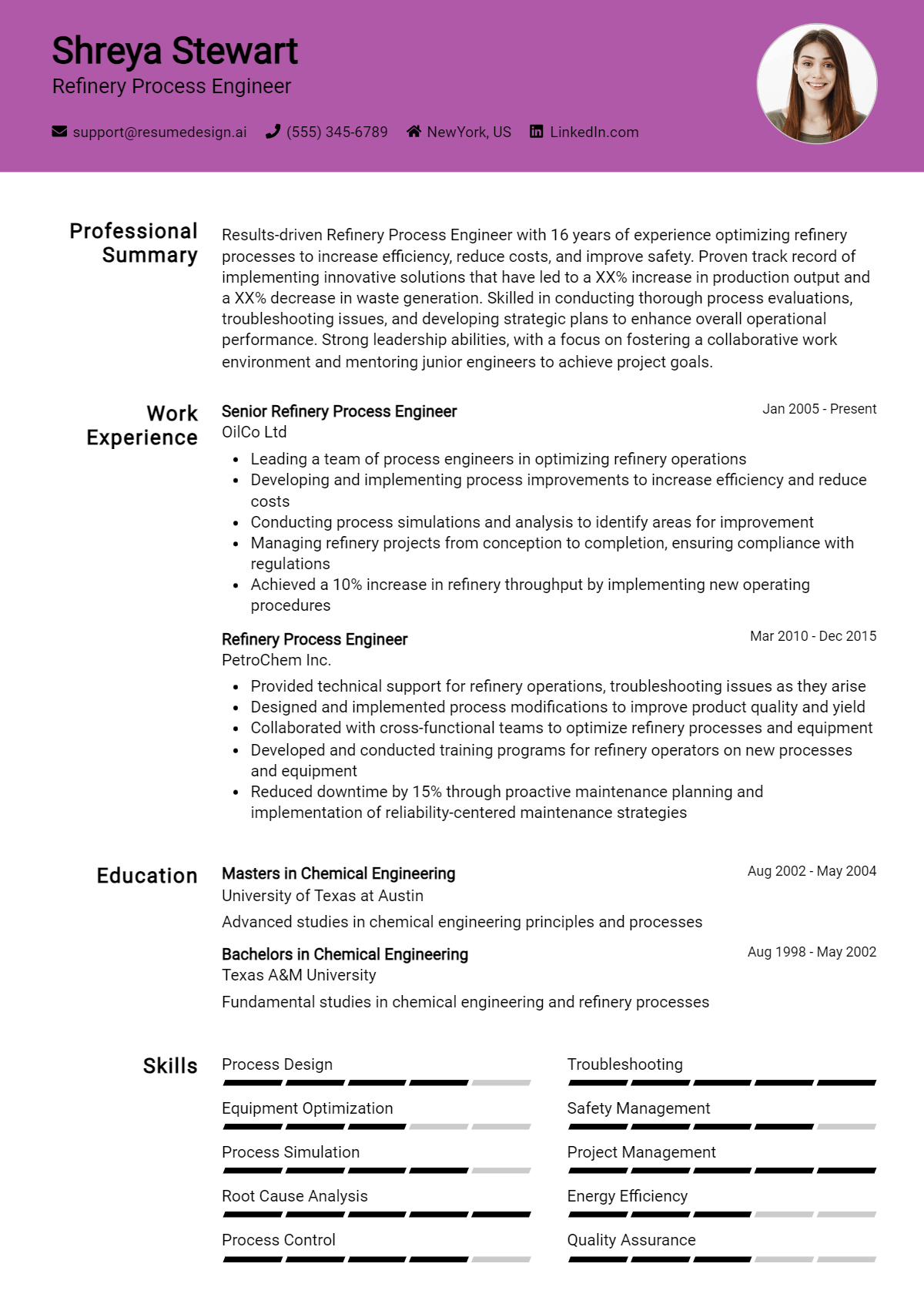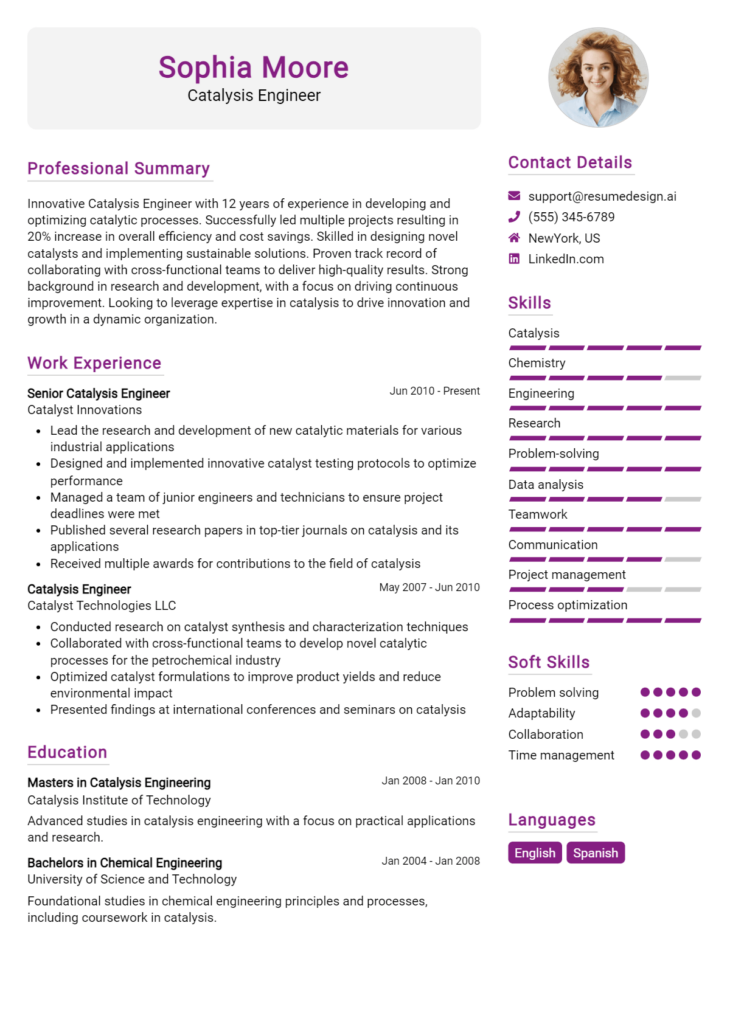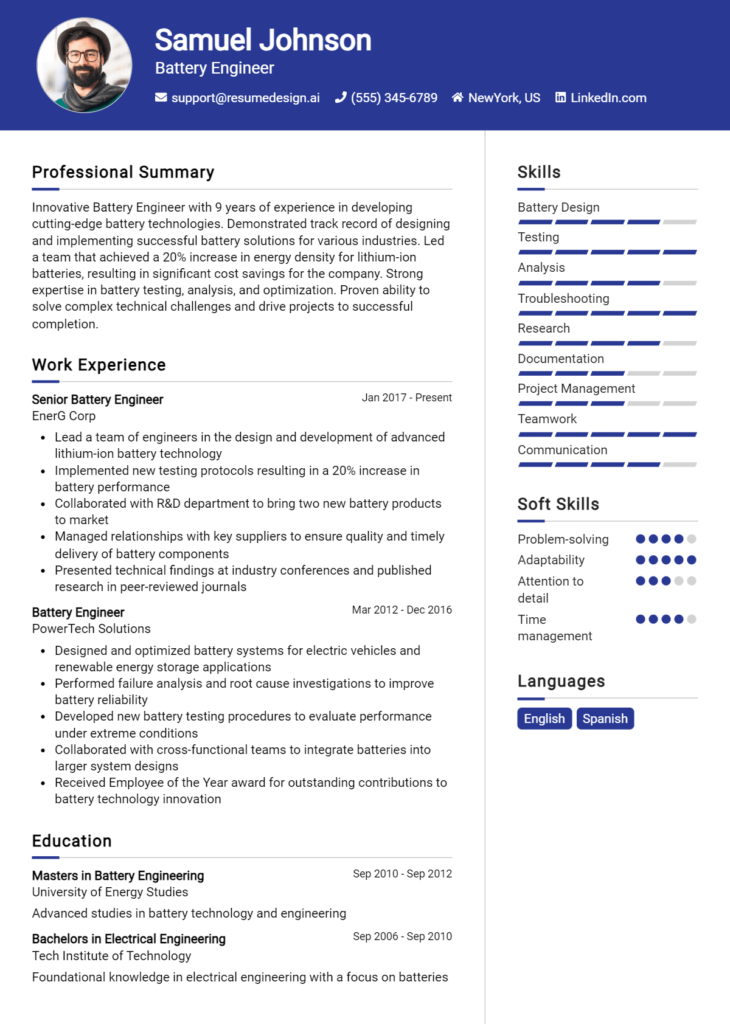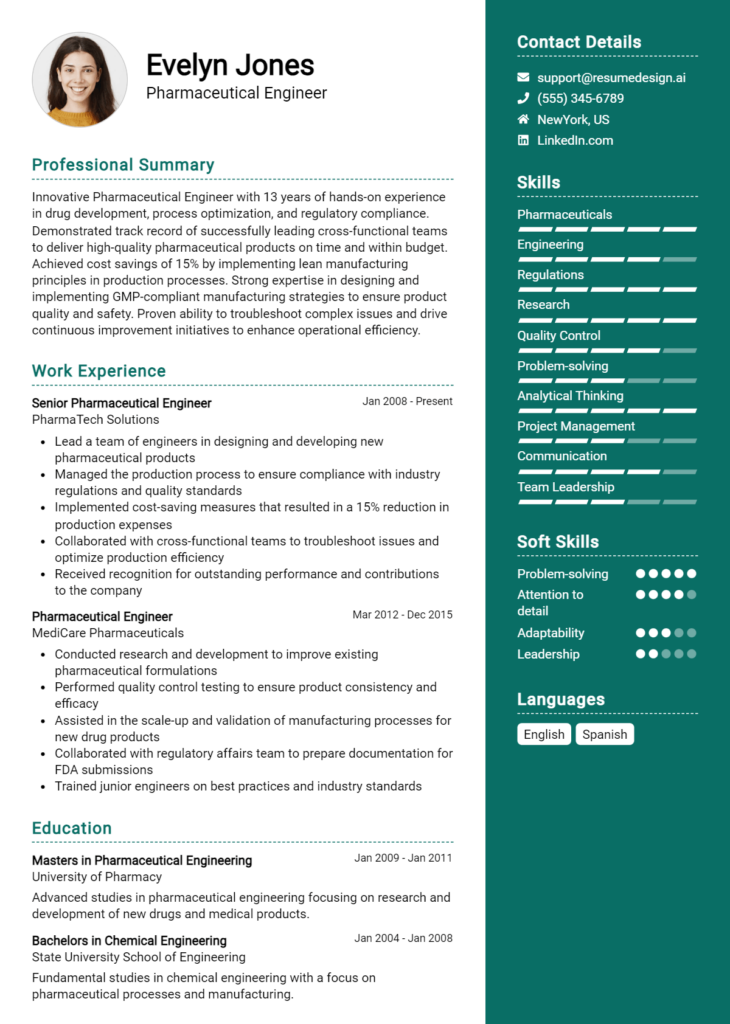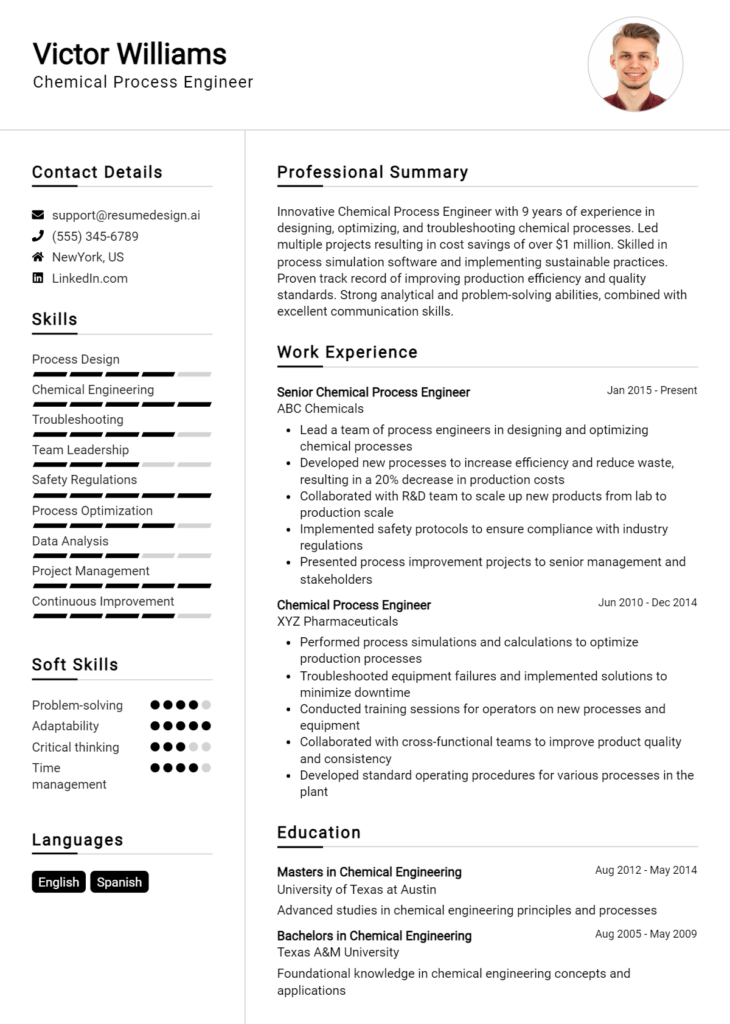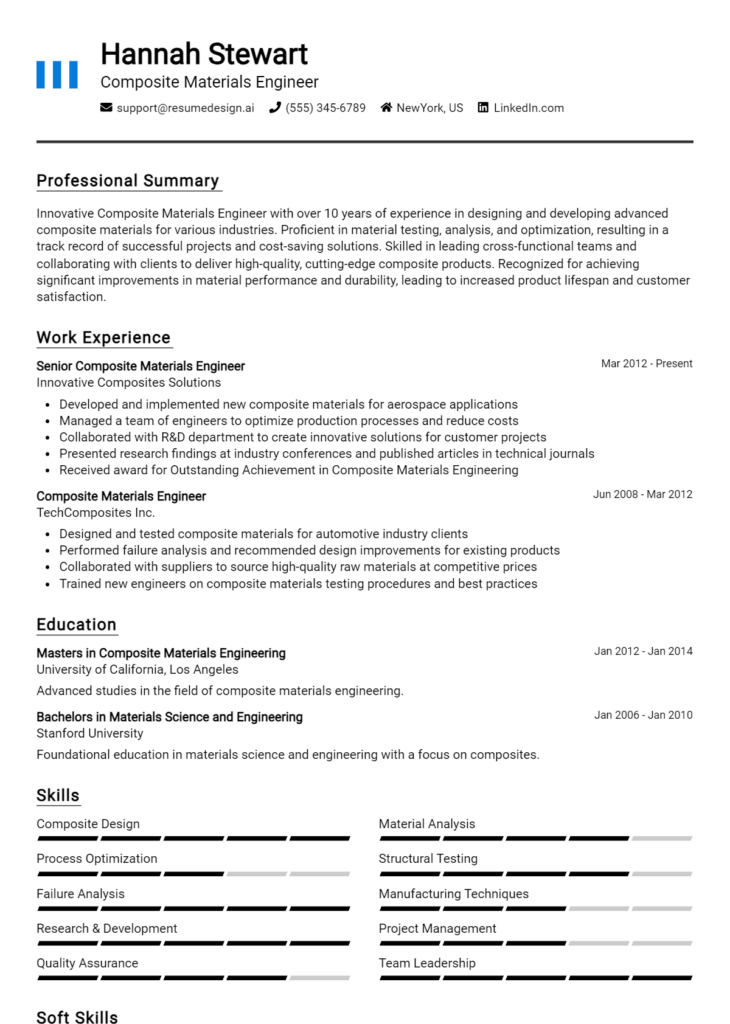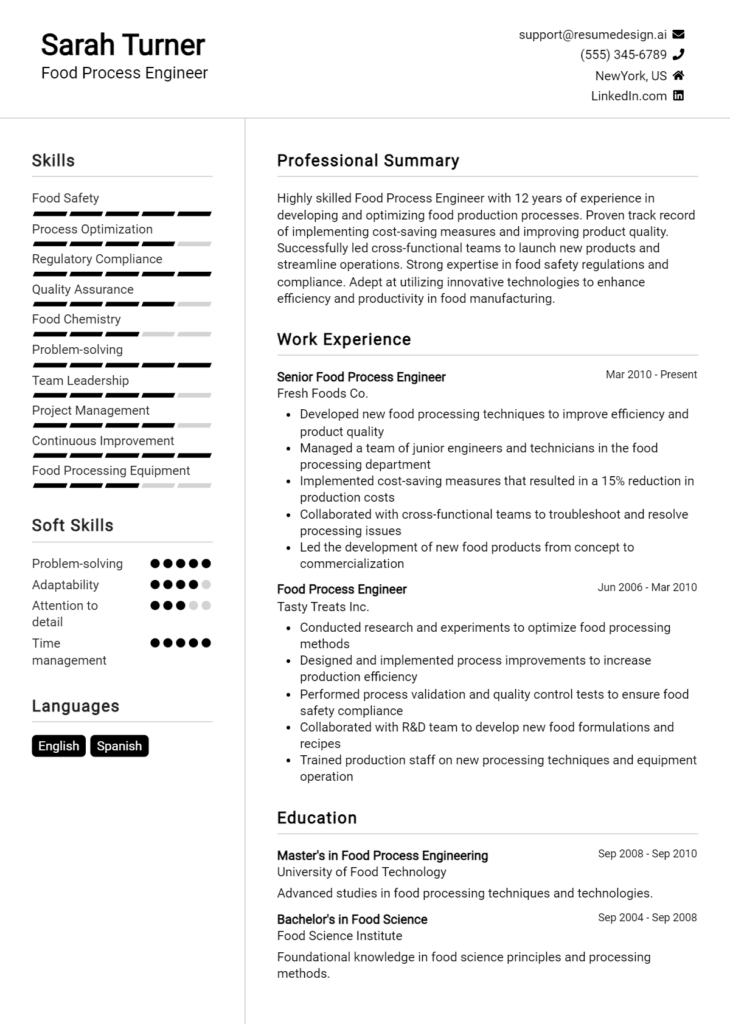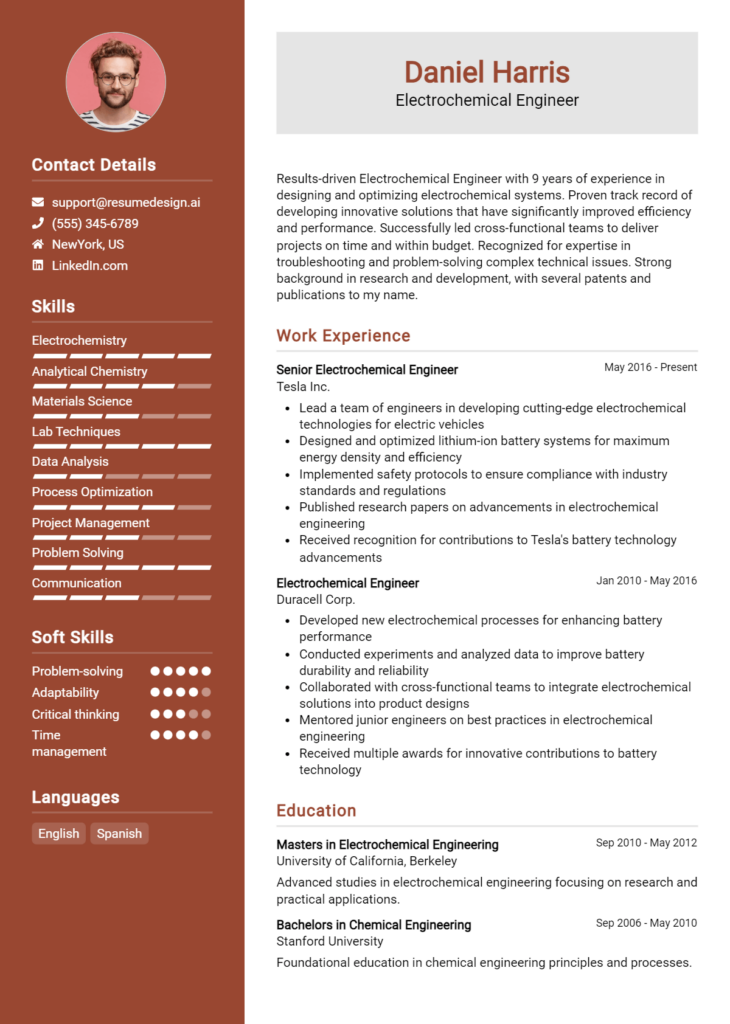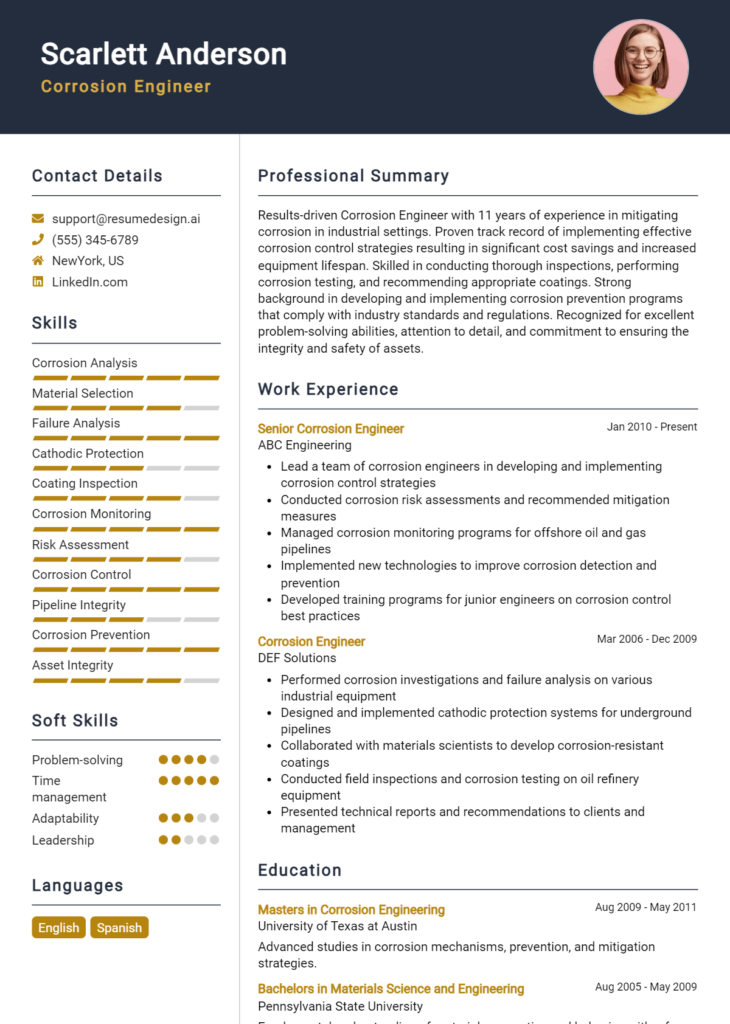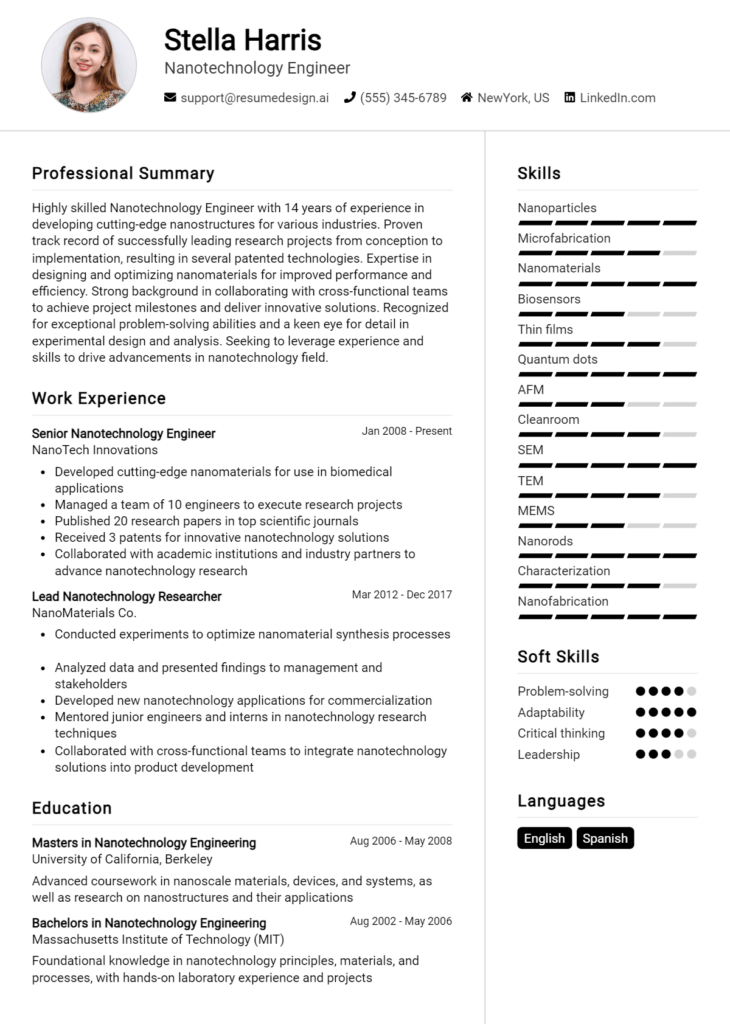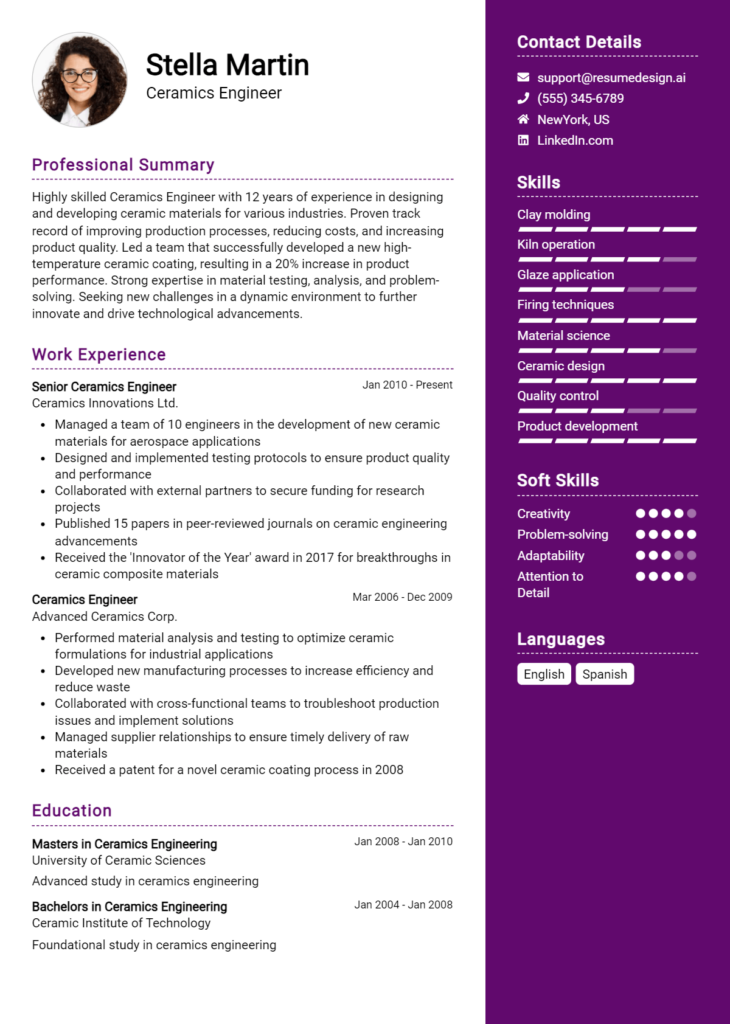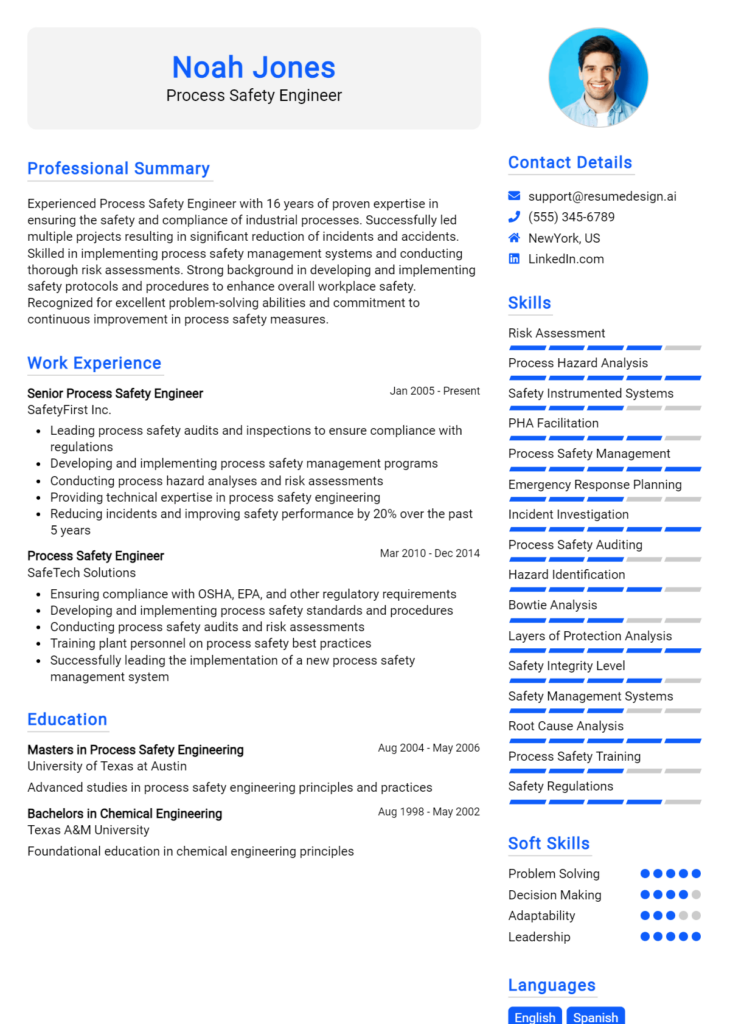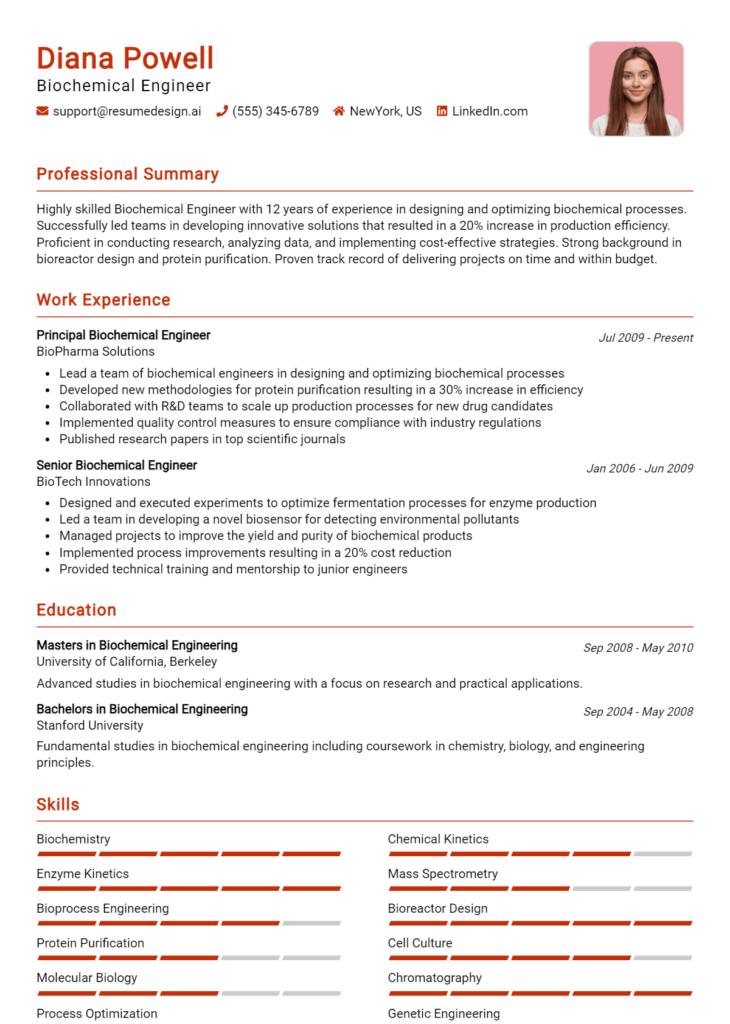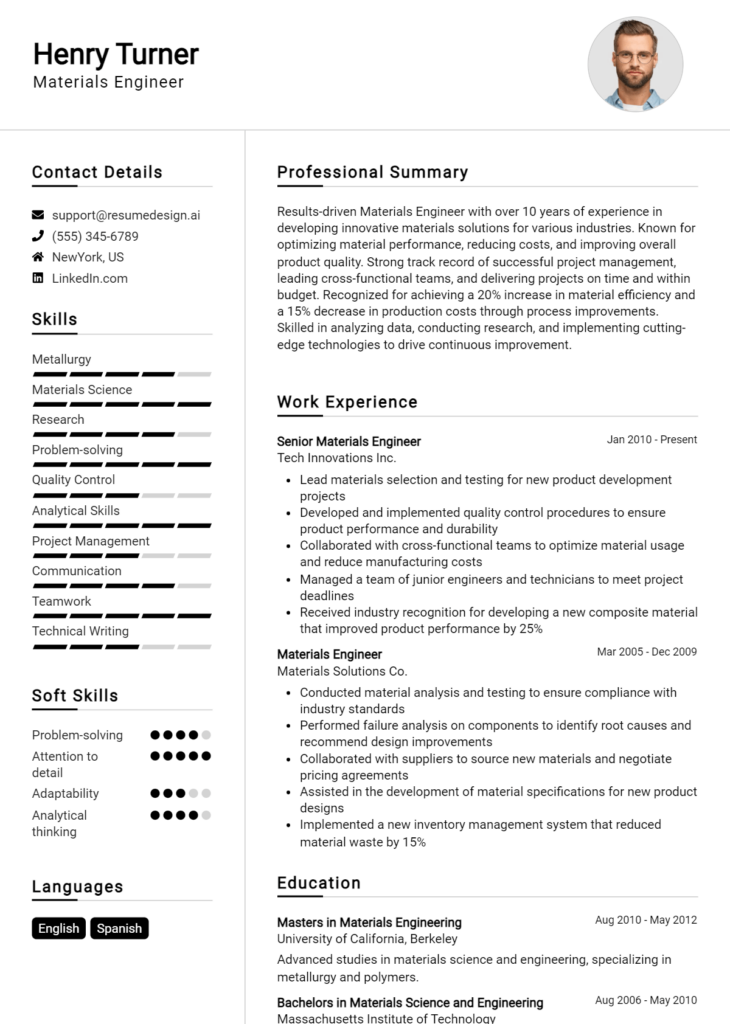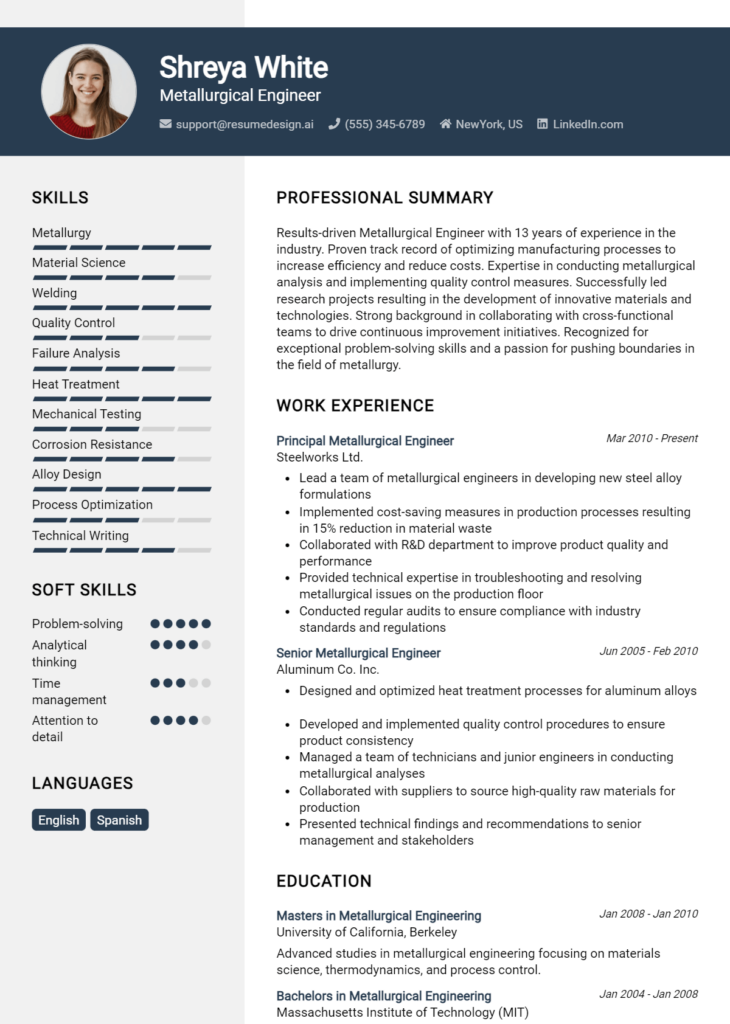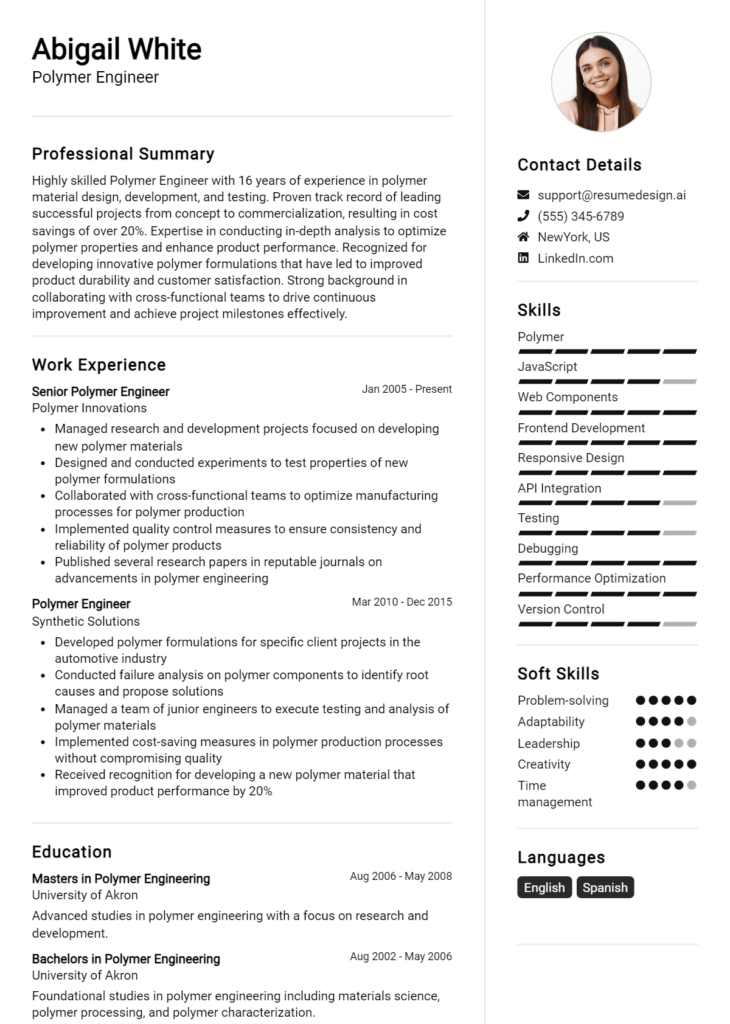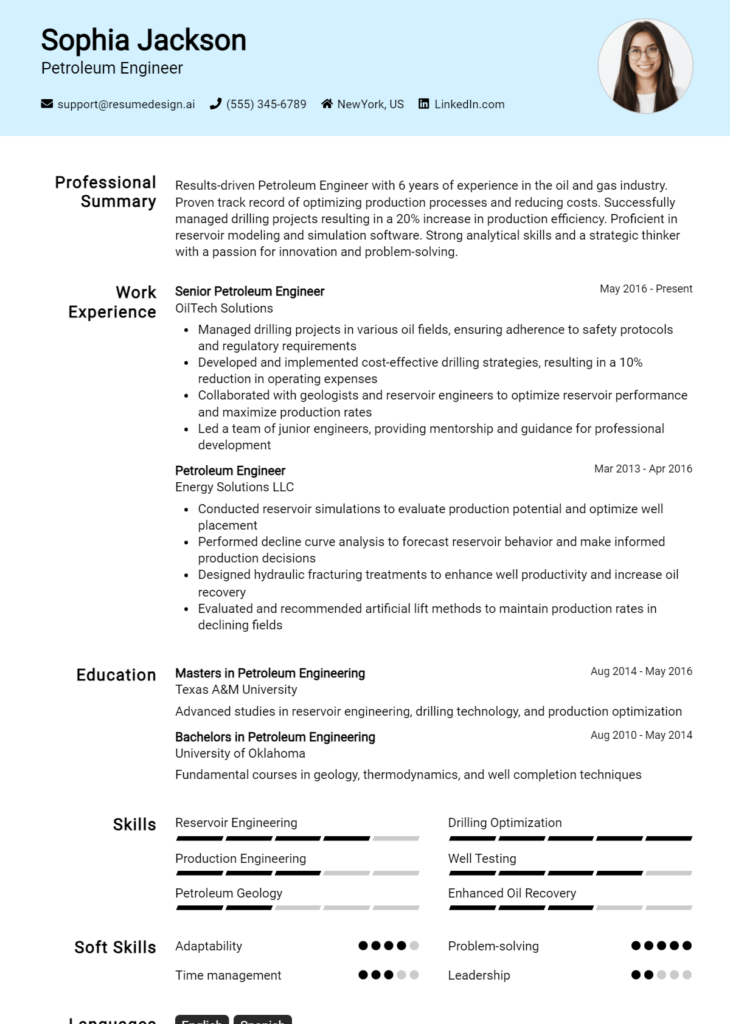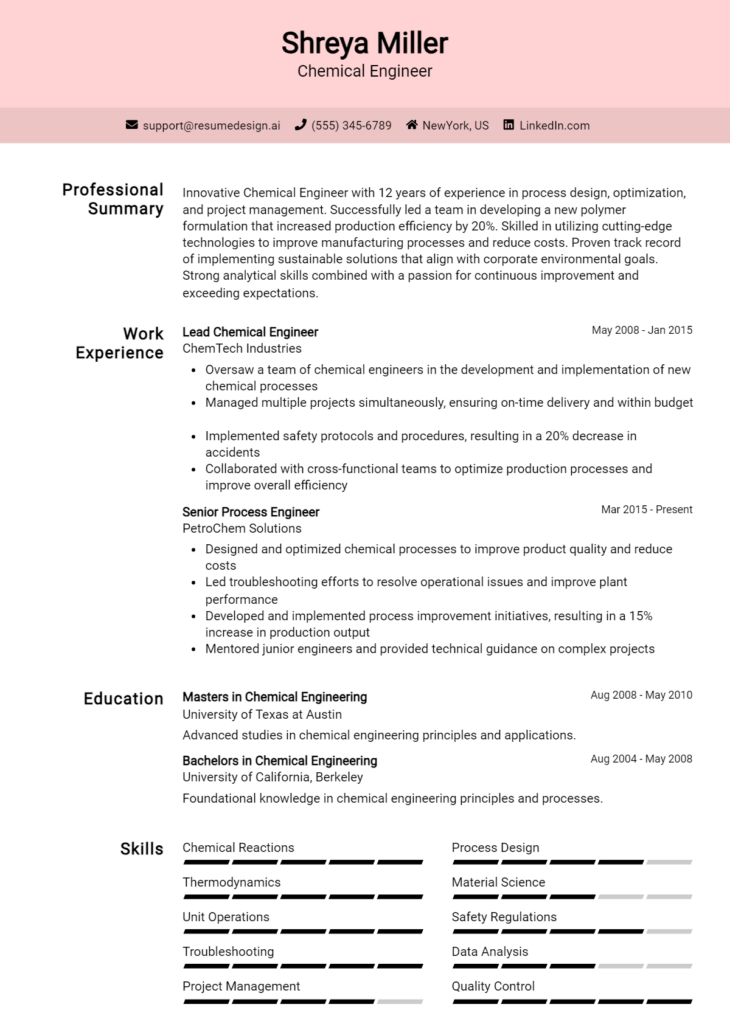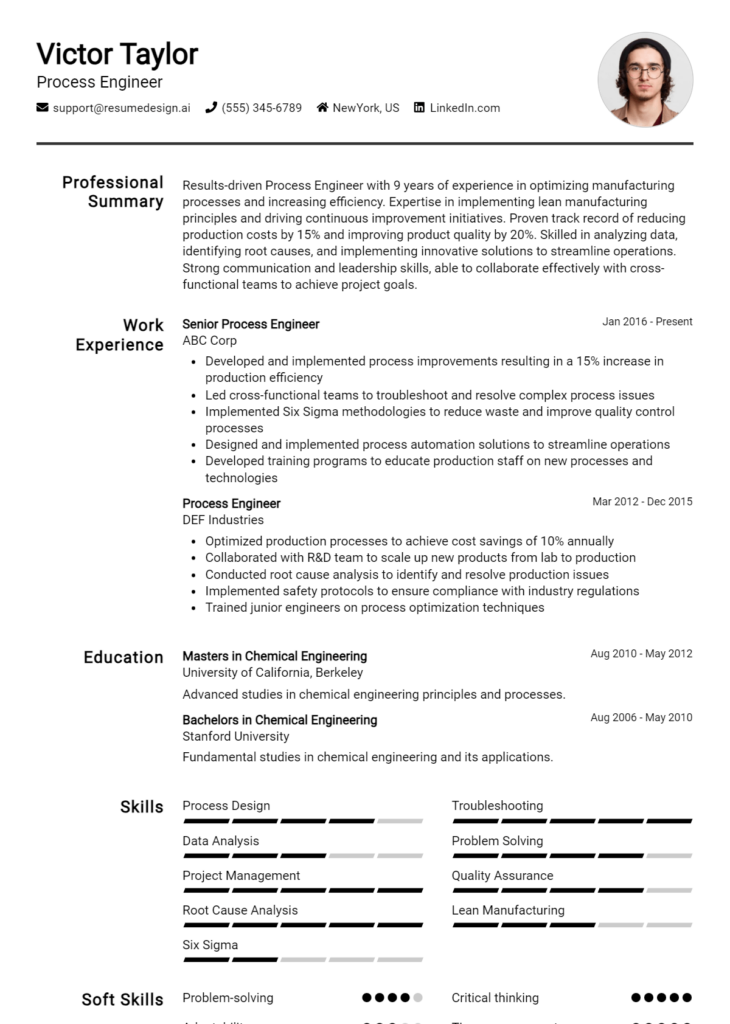Refinery Process Engineer Core Responsibilities
A Refinery Process Engineer plays a pivotal role in optimizing production processes, ensuring safety, and enhancing operational efficiency within a refinery. This professional collaborates across departments, integrating insights from engineering, operations, and safety to resolve complex issues. Key skills include technical expertise in chemical processes, strong analytical and problem-solving abilities, and effective communication. These competencies are essential for meeting organizational goals and maximizing profitability, which can be effectively highlighted in a well-structured resume.
Common Responsibilities Listed on Refinery Process Engineer Resume
- Design and optimize refinery processes for efficiency and safety.
- Conduct feasibility studies and develop process flow diagrams.
- Monitor process performance and implement improvements.
- Collaborate with multidisciplinary teams to troubleshoot operational issues.
- Ensure compliance with environmental and safety regulations.
- Analyze data to identify trends and recommend solutions.
- Prepare technical reports and documentation for stakeholders.
- Participate in training and mentoring junior engineers.
- Conduct risk assessments and develop mitigation strategies.
- Evaluate new technologies and their potential applications in refining.
- Support project management activities from conception to execution.
High-Level Resume Tips for Refinery Process Engineer Professionals
In the competitive field of refining, a well-crafted resume is not just a document; it is often the first impression a candidate makes on potential employers. For Refinery Process Engineer professionals, your resume must effectively showcase both your technical skills and your noteworthy achievements in order to stand out in a crowded job market. A strong resume reflects your industry expertise and communicates your value proposition clearly to hiring managers. This guide will provide practical and actionable resume tips tailored specifically for Refinery Process Engineer professionals, helping you to present your qualifications in the best possible light.
Top Resume Tips for Refinery Process Engineer Professionals
- Tailor your resume to the job description by incorporating relevant keywords and phrases that align with the specific requirements of the position.
- Highlight your relevant experience in refinery operations, process optimization, and safety compliance to demonstrate your expertise in the field.
- Quantify your achievements with specific metrics, such as percentage reductions in costs, increases in efficiency, or successful project completions.
- Showcase industry-specific skills, including knowledge of process simulation software, equipment design, and regulatory compliance.
- Include a section for certifications and training that are relevant to refinery processes, such as Six Sigma or OSHA certifications.
- Utilize a clean and professional format that enhances readability and ensures important information stands out.
- Incorporate action verbs in your bullet points to convey a sense of proactivity and impact in your previous roles.
- Consider adding a summary statement at the top of your resume that encapsulates your career highlights and focuses on your unique value to potential employers.
- Proofread your resume for any grammatical or spelling errors, as attention to detail is crucial in engineering roles.
By implementing these tips, Refinery Process Engineer professionals can significantly increase their chances of landing a job in their field. A well-structured and compelling resume that highlights relevant skills and achievements not only captures the attention of hiring managers but also positions candidates as top contenders in a highly specialized industry.
Why Resume Headlines & Titles are Important for Refinery Process Engineer
In the competitive field of refinery engineering, a well-crafted resume headline or title is crucial for capturing the attention of hiring managers. A strong headline can serve as a powerful first impression, effectively summarizing a candidate’s key qualifications in a succinct, impactful phrase. For a Refinery Process Engineer, this means highlighting relevant skills, experiences, and accomplishments that align with the specific requirements of the job. A concise and relevant headline not only stands out in a sea of applications but also provides a quick snapshot of what the candidate has to offer, making it an essential component of a successful resume.
Best Practices for Crafting Resume Headlines for Refinery Process Engineer
- Keep it concise: Aim for a headline that is no more than 10 words.
- Be specific: Use industry-related terms and focus on key skills or specializations.
- Showcase achievements: Incorporate metrics or results to highlight your impact.
- Use action words: Start with strong verbs to convey confidence and proactivity.
- Align with job description: Tailor the headline to match the specific role you are applying for.
- Avoid jargon: Ensure clarity by using straightforward language that is easily understood.
- Highlight certifications: If relevant, include any professional certifications that bolster your profile.
- Demonstrate value: Focus on what you can bring to the organization rather than just listing qualifications.
Example Resume Headlines for Refinery Process Engineer
Strong Resume Headlines
"Results-Driven Refinery Process Engineer with 10+ Years in Optimization"
"Certified Chemical Engineer Specializing in Refinery Operations and Safety"
"Innovative Refinery Engineer with Proven Track Record in Yield Improvement"
"Experienced Process Engineer Focused on Cost Reduction and Efficiency"
Weak Resume Headlines
"Engineer Seeking Opportunities"
"Refinery Engineer with Experience"
Strong resume headlines are effective because they provide a clear, immediate understanding of the candidate’s qualifications and value proposition. They use specific language that resonates with hiring managers and highlight key achievements or areas of expertise, making it easy for the reader to see the candidate's potential fit for the role. In contrast, weak headlines fail to create an impact due to their vagueness and lack of specificity; they do not convey any unique strengths or relevant experience, making it difficult for hiring managers to differentiate candidates in a competitive job market.
Writing an Exceptional Refinery Process Engineer Resume Summary
A well-crafted resume summary is pivotal for a Refinery Process Engineer as it serves as the first impression on hiring managers. This brief section quickly captures attention by highlighting key skills, relevant experience, and notable accomplishments that align with the job role. An impactful summary is concise yet powerful, tailored to the specific position the candidate is applying for, ensuring that it resonates with the needs of the employer and effectively showcases the applicant's qualifications.
Best Practices for Writing a Refinery Process Engineer Resume Summary
- Quantify Achievements: Use numbers and percentages to illustrate the impact of your work.
- Focus on Relevant Skills: Highlight technical skills and competencies that are pertinent to refinery processes.
- Tailor for Each Job: Customize your summary to reflect the specific requirements and responsibilities listed in the job description.
- Use Action Verbs: Start with strong action verbs to convey your contributions and initiatives.
- Showcase Industry Knowledge: Demonstrate awareness of industry trends and standards that are relevant to the role.
- Keep It Concise: Aim for 3-5 sentences that deliver maximum information in a minimal amount of space.
- Highlight Problem-Solving Skills: Emphasize your ability to identify and solve complex engineering challenges.
- Include Certifications: Mention any relevant certifications or licenses that enhance your qualifications.
Example Refinery Process Engineer Resume Summaries
Strong Resume Summaries
Results-driven Refinery Process Engineer with over 8 years of experience in optimizing refining processes, resulting in a 15% increase in yield and a 20% reduction in operational costs. Proven expertise in process simulation and advanced control strategies, coupled with a Master’s degree in Chemical Engineering.
Detail-oriented Process Engineer skilled in implementing process improvements that enhance safety and efficiency. Successfully led a team project that reduced downtime by 30% and improved throughput by 25%, while ensuring compliance with environmental regulations.
Dynamic Refinery Process Engineer with a track record of managing cross-functional teams to implement innovative refining technologies. Achieved a 10% reduction in energy consumption across multiple units, enhancing sustainability efforts and operational performance.
Weak Resume Summaries
Experienced engineer looking for a challenging position in a refinery. I have worked in different roles and have some knowledge of process engineering.
Process Engineer with various skills seeking new opportunities. I am a team player and can adapt to different situations.
The strong resume summaries are considered effective because they provide specific, quantifiable results, clearly demonstrate relevant skills, and directly relate to the responsibilities of a Refinery Process Engineer. They convey a strong sense of accomplishment and expertise. In contrast, the weak summaries lack detail, specificity, and measurable outcomes, making them generic and less appealing to hiring managers.
Work Experience Section for Refinery Process Engineer Resume
The work experience section of a Refinery Process Engineer resume is crucial for demonstrating a candidate's technical expertise and practical application of engineering principles in a dynamic and high-stakes environment. This section not only highlights the individual's ability to manage teams and collaborate effectively across departments but also emphasizes their role in delivering high-quality products that meet rigorous industry standards. By quantifying achievements and aligning previous experience with the specific demands of the refinery sector, candidates can showcase their readiness to take on complex challenges and drive operational excellence.
Best Practices for Refinery Process Engineer Work Experience
- Focus on technical expertise by detailing specific engineering methodologies and technologies used.
- Quantify results wherever possible; use metrics such as percentage improvements, cost savings, or production increases.
- Highlight leadership roles and team management experiences to showcase collaboration and communication skills.
- Align experiences with industry standards and regulations to demonstrate compliance knowledge.
- Use action verbs to convey impact and initiative in each statement.
- Tailor experiences to the job description, emphasizing relevant skills and responsibilities.
- Include cross-functional teamwork examples to illustrate adaptability and relationship-building abilities.
- Showcase continuous improvement initiatives and innovative solutions implemented during tenure.
Example Work Experiences for Refinery Process Engineer
Strong Experiences
- Led a project team that improved refinery efficiency by 25% through the implementation of a new distillation process, resulting in annual savings of $2 million.
- Managed a cross-disciplinary team of 10 engineers and technicians to successfully design and execute a waste reduction strategy, reducing waste by 30% in compliance with environmental standards.
- Developed and executed a maintenance schedule that decreased equipment downtime by 15%, enhancing overall production capacity.
- Collaborated with safety teams to revise operational protocols, achieving a 40% reduction in safety incidents over two years.
Weak Experiences
- Worked on various projects in the refinery without specific details on contributions or outcomes.
- Assisted in team discussions and meetings related to process improvements.
- Helped in managing daily tasks and operations within the refinery.
- Participated in training sessions and workshops for engineering practices.
The examples of strong experiences are considered effective because they provide specific, quantifiable outcomes that demonstrate the candidate's impact on the refinery's operations. These statements clearly articulate the candidate's role in achieving significant improvements and showcase their technical leadership and collaborative efforts. In contrast, the weak experiences lack detail and measurable results, making them less compelling and failing to convey the candidate's true capabilities and contributions to potential employers.
Education and Certifications Section for Refinery Process Engineer Resume
The education and certifications section of a Refinery Process Engineer resume is crucial for showcasing a candidate's academic qualifications, industry-specific certifications, and commitment to ongoing professional development. This section not only highlights the candidate's foundational knowledge and technical skills but also demonstrates their dedication to staying current with industry standards and advancements. By including relevant coursework, certifications, and specialized training, candidates can significantly enhance their credibility and alignment with the job role, making them more appealing to potential employers.
Best Practices for Refinery Process Engineer Education and Certifications
- Prioritize relevant degrees in chemical engineering, petroleum engineering, or related fields.
- List industry-recognized certifications such as Certified Petroleum Engineer (CPE) or Six Sigma Green Belt.
- Include relevant coursework that reflects knowledge applicable to refinery processes, such as thermodynamics and fluid mechanics.
- Highlight any specialized training in process safety management or environmental regulations.
- Ensure all certifications are current, and include the expiration dates if applicable.
- Use clear and concise language to describe educational experiences without unnecessary jargon.
- Be honest about qualifications to maintain credibility with potential employers.
- Consider adding any relevant professional development workshops or conferences attended.
Example Education and Certifications for Refinery Process Engineer
Strong Examples
- Bachelor of Science in Chemical Engineering, University of Texas, 2018.
- Certified Petroleum Engineer (CPE), National Institute for Petroleum Engineering, 2020.
- Completed coursework in Process Control and Reactor Design.
- Six Sigma Green Belt Certification, American Society for Quality, 2021.
Weak Examples
- Associate Degree in General Studies, Community College, 2016.
- Certification in Basic Computer Skills, Online Learning Platform, 2019.
- Completed coursework in Art History and English Literature.
- Outdated certification in Project Management from 2015.
The strong examples are considered effective because they directly align with the qualifications needed for a Refinery Process Engineer, showcasing relevant degrees and certifications that demonstrate technical expertise. In contrast, the weak examples fail to relate to the field, highlighting irrelevant qualifications or outdated credentials that do not support the candidate's ability to perform in the role. This distinction is essential for making a strong impression on potential employers, ensuring that the candidate is perceived as both qualified and knowledgeable in their field.
Top Skills & Keywords for Refinery Process Engineer Resume
As a Refinery Process Engineer, the role demands a unique blend of technical expertise and interpersonal abilities. The importance of highlighting both hard and soft skills in your resume cannot be overstated, as they play a critical role in showcasing your capabilities to potential employers. Hard skills demonstrate your technical proficiency in areas such as process design, safety management, and equipment operation, while soft skills reflect your ability to communicate effectively, work collaboratively in teams, and adapt to changing conditions. A well-rounded resume that emphasizes these skills will significantly enhance your chances of securing an interview and ultimately landing the job.
Top Hard & Soft Skills for Refinery Process Engineer
Soft Skills
- Effective communication
- Problem-solving
- Team collaboration
- Adaptability
- Leadership
- Attention to detail
- Time management
- Critical thinking
- Conflict resolution
- Decision-making
Hard Skills
- Process simulation software (e.g., Aspen Plus, HYSYS)
- Knowledge of chemical engineering principles
- Familiarity with refinery operations and equipment
- Expertise in process optimization
- Safety regulations and compliance (OSHA, EPA)
- Project management
- Data analysis and interpretation
- Quality control techniques
- Process control systems
- Technical report writing
By incorporating these skills into your resume, along with a comprehensive overview of your work experience, you will present a compelling case for your candidacy as a Refinery Process Engineer.
Stand Out with a Winning Refinery Process Engineer Cover Letter
Dear [Hiring Manager's Name],
I am writing to express my interest in the Refinery Process Engineer position at [Company Name], as advertised on [where you found the job listing]. With a solid foundation in chemical engineering and over [X years] of hands-on experience in refinery operations, I am excited about the opportunity to contribute to your team. My background includes optimizing processes, enhancing safety measures, and implementing innovative solutions that drive efficiency and reduce operational costs.
In my previous role at [Previous Company Name], I spearheaded a project that focused on the optimization of the distillation unit, resulting in a 15% increase in throughput while simultaneously reducing energy consumption. I utilized advanced process simulation software to model various scenarios, which enabled our team to identify key areas for improvement. My collaborative approach allowed me to work effectively with cross-functional teams, ensuring that all stakeholders were engaged and that the implemented solutions were sustainable long-term. I am particularly drawn to [Company Name] because of its commitment to sustainability and innovation in refining processes, and I am eager to bring my expertise in process optimization and project management to your esteemed organization.
Additionally, I possess a deep understanding of process safety management and am well-versed in regulatory compliance. I am dedicated to fostering a culture of safety and am proactive in identifying potential risks before they escalate. My ability to analyze complex data and translate findings into actionable strategies has been instrumental in my success as a process engineer. I am confident that my skills in process design and improvement, combined with my passion for the refining industry, will make a significant impact at [Company Name].
I am looking forward to the opportunity to further discuss how my background, skills, and enthusiasms align with the goals of your team. Thank you for considering my application. I hope to contribute to the continued success of [Company Name] and am excited about the prospect of collaborating with such a talented group of professionals.
Sincerely,
[Your Name]
[Your LinkedIn Profile] (if applicable)
[Your Contact Information]
Common Mistakes to Avoid in a Refinery Process Engineer Resume
Crafting a resume as a Refinery Process Engineer requires careful attention to detail and an understanding of the industry's specific demands. Many candidates make common mistakes that can hinder their chances of landing an interview. By avoiding these pitfalls, you can present a polished and professional resume that effectively showcases your skills and experiences. Here are some common mistakes to watch out for:
Generic Objective Statement: Using a vague objective that doesn't target the specific refinery role can make your resume blend in rather than stand out. Tailor your statement to reflect your goals and how they align with the company’s needs.
Lack of Relevant Keywords: Not incorporating industry-specific keywords can result in your resume being overlooked by applicant tracking systems (ATS). Research job descriptions to identify important terms and phrases to include in your resume.
Overemphasis on Duties Instead of Achievements: Listing job responsibilities without highlighting specific accomplishments can make your experience seem less impactful. Focus on quantifiable achievements, such as cost savings or efficiency improvements, to demonstrate your contributions.
Ignoring Technical Skills: Failing to showcase essential technical skills relevant to refinery processes can be detrimental. Ensure you include specific engineering software, methodologies, and technical proficiencies that are crucial for the role.
Inconsistent Formatting: Using inconsistent fonts, sizes, or bullet styles can create a disorganized appearance. Stick to a clean and professional format to ensure your resume is easy to read and visually appealing.
Excessive Length: Submitting a lengthy resume that exceeds two pages can deter hiring managers from reviewing your qualifications thoroughly. Aim for brevity by including only the most relevant information that aligns with the job description.
Neglecting Professional Development: Omitting certifications, training, or continued education related to process engineering can signal a lack of commitment to professional growth. Highlight relevant certifications or courses to show your dedication to staying updated in the field.
Failure to Tailor for Each Application: Sending the same resume to multiple employers without customizing it for each position can lead to missed opportunities. Tailor your resume to reflect the specific skills and experiences that align with each job application.
Conclusion
As a Refinery Process Engineer, your role is crucial in optimizing and improving processes within the refinery. Key responsibilities include analyzing production data, troubleshooting process issues, and implementing solutions to enhance efficiency and safety. It’s essential to stay updated with the latest technologies and industry standards to ensure compliance and maximize output.
Throughout this article, we've discussed the importance of technical skills, problem-solving abilities, and teamwork in achieving success in this field. Moreover, we highlighted the need for continuous learning and professional development to keep pace with the evolving landscape of refinery engineering.
Now is the perfect time to take a closer look at your Refinery Process Engineer resume. Make sure it effectively showcases your skills and experiences. Consider using tools like resume templates to create a professional layout, or try the resume builder for a more guided approach. You can also reference resume examples for inspiration and ensure your resume stands out. Don't forget about the importance of a compelling introduction—check out the cover letter templates available to enhance your application further.
Take action today and refine your resume to make a lasting impression in the competitive field of refinery engineering!

